Why So Many People Skip Their Medications - And How Support Groups Fix It
Half of all people with chronic illnesses don’t take their meds as prescribed. That’s not laziness. It’s not forgetfulness alone. It’s loneliness. It’s confusion. It’s fear. It’s the weight of managing multiple pills, side effects, and endless doctor visits without anyone who truly gets it. The World Health Organization says medication non-adherence costs the U.S. healthcare system between $100 billion and $300 billion a year. But here’s the truth: no brochure, no text reminder, and no stern warning from a doctor can replace the power of someone saying, "I’ve been there. Here’s what worked for me."
How Peer Support Actually Changes Behavior
Traditional health education tells you what to do. Support groups show you how to do it. A 2020 review in the Journal of Medical Care found that peer-led programs improved medication adherence with an effect size of 0.40 - nearly three times stronger than just handing out printed instructions. Why? Because people trust peers more than pamphlets. When someone in your group shares how they crushed their 6 a.m. pill routine by keeping their meds next to their coffee maker, you don’t just hear it - you see it working. That’s behavioral change, not just information.
Programs like the American Heart Association’s Heart360 pair patients with peer mentors who’ve managed heart disease for at least two years. These aren’t volunteers with good intentions - they’re trained, certified, and followed up with. The result? Participants are more likely to stick with their blood pressure or cholesterol meds long-term. One study showed that patients in these groups were 28% more likely to stay on track after a year than those using apps alone. Why? Emotional connection. Accountability. Shared struggle.
Family Support Is the Secret Weapon
It’s not just strangers helping strangers. Family involvement makes a massive difference. A 2021 study reviewed 14 separate trials and found that when a spouse, parent, or sibling helped remind someone to take their pills, adherence jumped significantly. In 11 of those 14 cases, the improvement was statistically strong. One mother in Melbourne started keeping her son’s diabetes meds in her purse after school. She didn’t lecture. She just asked, "Did you take your insulin before dinner?" That simple check-in cut his missed doses by 80% in three months.
But family support isn’t always easy. Sometimes it feels like nagging. That’s why the best programs train families too - not to be nurses, but to be steady, calm partners in care. They learn how to listen, not fix. How to ask, not command. How to celebrate small wins, like taking meds for seven days straight.
What Works Best: In-Person, Digital, or Hybrid?
There’s no one-size-fits-all. But the data shows clear winners.
- In-person peer groups (8-12 people, weekly) have the highest long-term adherence. People show up because they know others are waiting. They build real relationships. A 2023 study in Frontiers in Pharmacology found these groups had 28% higher retention than digital-only options.
- Digital platforms (apps, online forums) offer 24/7 access and anonymity. They’re great for people who can’t leave home or live far from services. Apps like reSET-O, approved by the FDA in 2021, combine coaching with reminders and have shown solid results.
- Hybrid models - combining weekly in-person meetings with daily app check-ins - are the most powerful. A 2023 study on hypertension patients showed a 34% boost in adherence when both were used together. The app handles reminders. The group handles motivation.
One downside? Rural areas. Only 53% of the number of urban programs exist in rural communities. If you live 40 miles from the nearest clinic, driving to a group meeting isn’t practical. That’s why mobile health workers - trained community members who visit homes - are becoming essential in these areas. They bring the group to you.
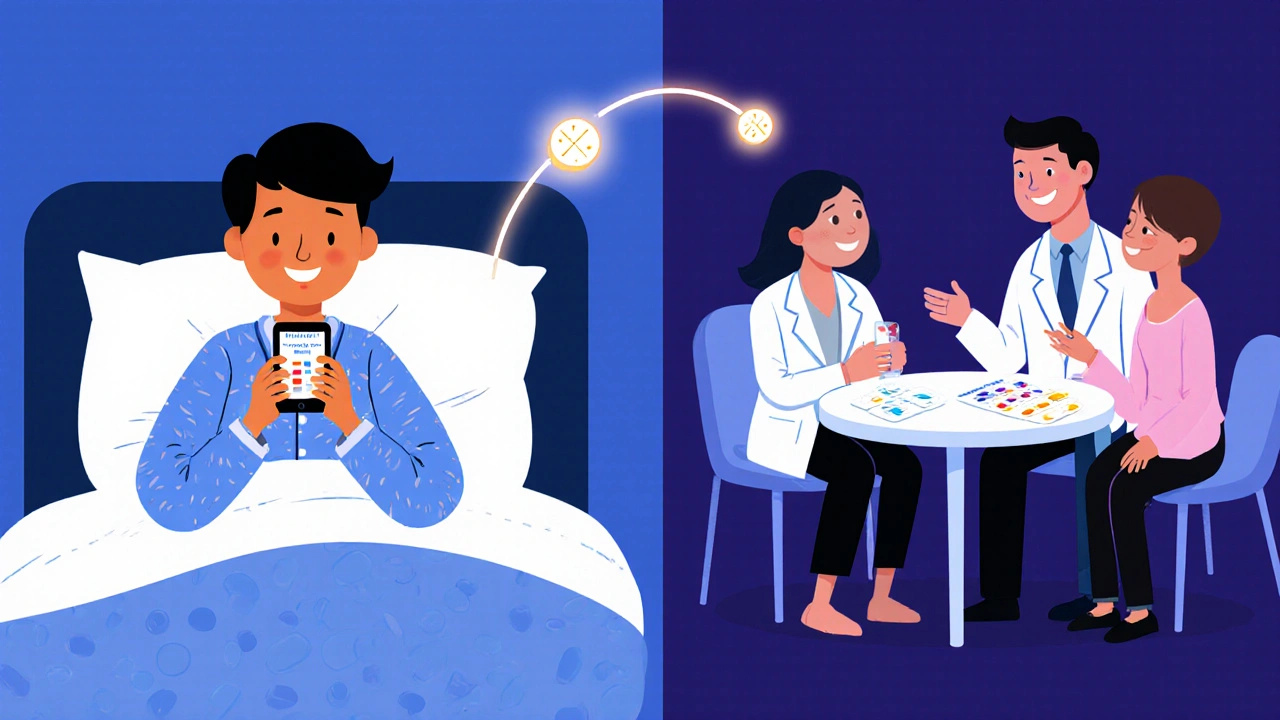
Who Runs These Programs - And How Are They Trained?
Not just anyone can lead a support group. The most effective programs require facilitators with at least 40 hours of certified training. That includes active listening, understanding medication schedules, spotting depression signs, and cultural sensitivity. A 2021 survey by the National Council for Mental Wellbeing found 92% of successful programs rated active listening as essential. Without it, groups become lectures.
Many programs now include pharmacists. Why? They know your meds inside out. A 2014 Cochrane Review showed pharmacist-led groups improved adherence by 23% more than doctor-led ones. Pharmacists can explain why you’re on four pills instead of one, help you simplify your regimen, and spot dangerous interactions. In fact, 73% of high-performing programs include a pharmacist as part of the team.
Real Stories: What People Actually Say
On Reddit’s r/ChronicIllness, a user named DiabetesWarrior87 wrote: "I was missing 3-4 doses a week. My A1c was 8.5%. After 6 months in a weekly support group, I’m down to less than one missed dose. My A1c is 6.9%. I didn’t change my diet. I just stopped feeling alone."
The PatientsLikeMe platform surveyed over 12,000 users. Seventy-eight percent said their adherence improved because of their group. Sixty-three percent said the most valuable part was hearing how others handled side effects - nausea, dizziness, fatigue. Not the doctor’s script. Not the website. Real people sharing real workarounds.
But it’s not perfect. Forty-two percent of participants in a 2021 NAMI survey said scheduling conflicts made it hard to keep going. Twenty-nine percent felt uncomfortable speaking in groups. And 35% of African American participants in hypertension groups reported much higher satisfaction when the group was culturally matched - same language, same background, same understanding of systemic barriers.
Barriers That Still Exist
Access isn’t equal. Only 22% of community programs offer materials in languages other than English - even though one in four Americans has limited English proficiency. Rural areas have 47% fewer programs per capita than cities. And too many groups rely on short-term grants. A 2023 survey found 41% of nonprofit programs were financially unstable. Without consistent funding, they close.
Another issue? Tracking. Only 38% of community programs use validated tools like the Morisky Medication Adherence Scale to measure success. If you can’t measure it, you can’t improve it. And if you can’t prove it works, you can’t get paid for it.
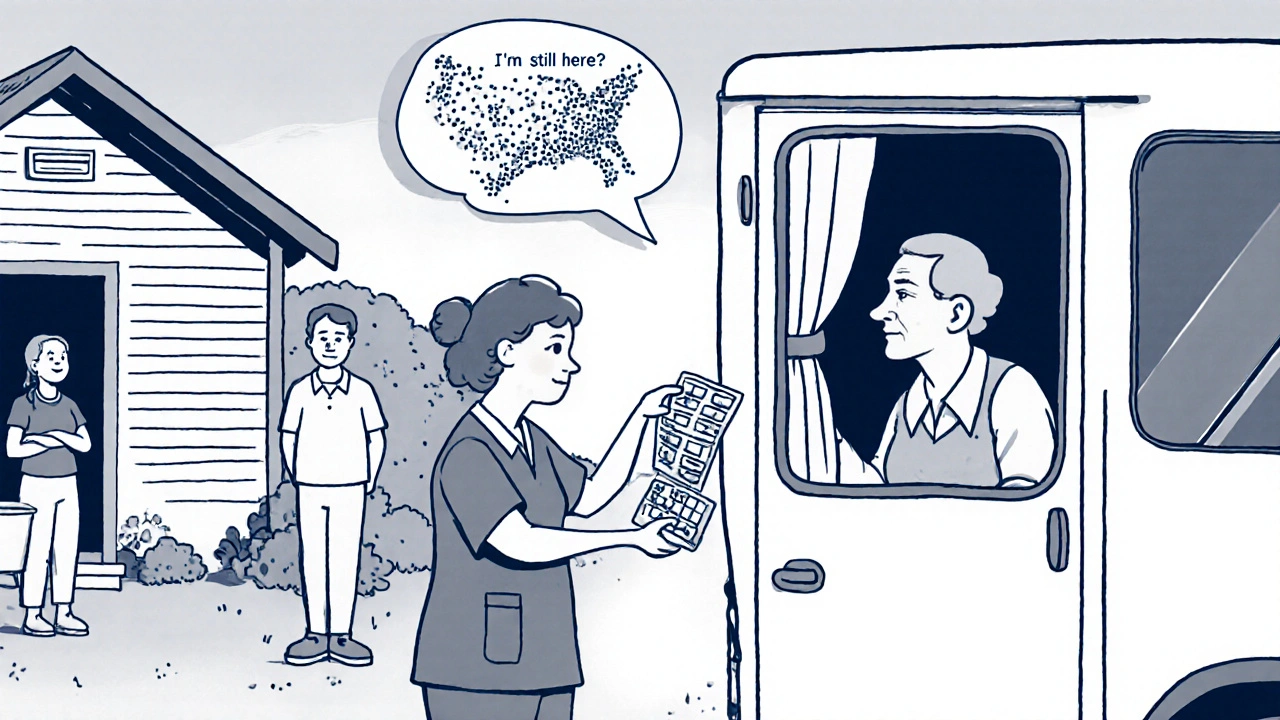
How to Start or Join a Program
If you’re looking for support:
- Ask your doctor or pharmacist. Many clinics now partner with local groups.
- Check with your insurance. Medicare Advantage plans (63% of them in 2023) include medication adherence support.
- Search for condition-specific groups. Diabetes, hypertension, depression - each has active networks.
- Look for programs with trained facilitators and regular meetings. Avoid ones that feel like drop-in chats with no structure.
- Try a hybrid option. If you can’t make it in person, find a group that offers an app or text check-ins too.
If you’re a provider or community leader:
- Start small. Pilot with 15-20 people for two months.
- Train facilitators properly - at least 40 hours. Use certified curricula.
- Partner with a pharmacist. Their expertise is irreplaceable.
- Use simple tools to track adherence. Even a weekly text survey works.
- Apply for funding. CMS now allocates $50 million annually for community health worker-led adherence programs.
The Bigger Picture: Why This Isn’t Just Nice - It’s Necessary
Medication compliance isn’t about being "good" at taking pills. It’s about being supported enough to keep going. A 2022 study in JAMA Network Open found a diabetes support program had an 18:1 return on investment - for every dollar spent, $18 was saved in avoided hospitalizations. That’s not charity. That’s smart health care.
When people feel heard, seen, and understood, they don’t just take their meds. They start sleeping better. Moving more. Eating differently. Their whole life improves. That’s the ripple effect. And it starts with a group of people sitting in a room, saying, "I’m still here. Are you?"
What’s Next for Medication Support?
The future is integration. Programs are moving beyond just pills. They’re linking to food assistance, transportation help, mental health counseling. The FDA-approved digital therapeutic reSET-O is now being paired with in-person coaching. Medicare is expanding coverage. Hospitals are being paid for outcomes, not just visits.
But the core hasn’t changed. People need connection. They need to know they’re not alone. That’s not a trend. It’s human nature. And as long as medicine keeps getting more complex, community support will keep being the thing that keeps people alive.

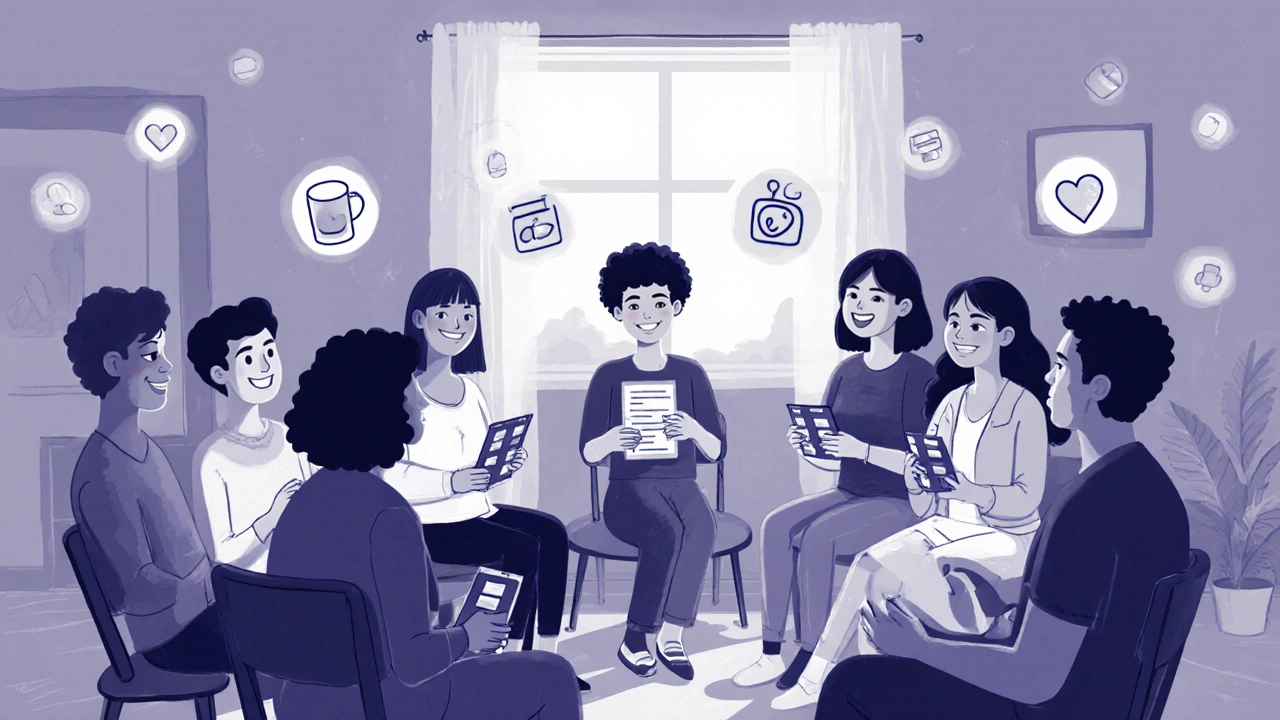
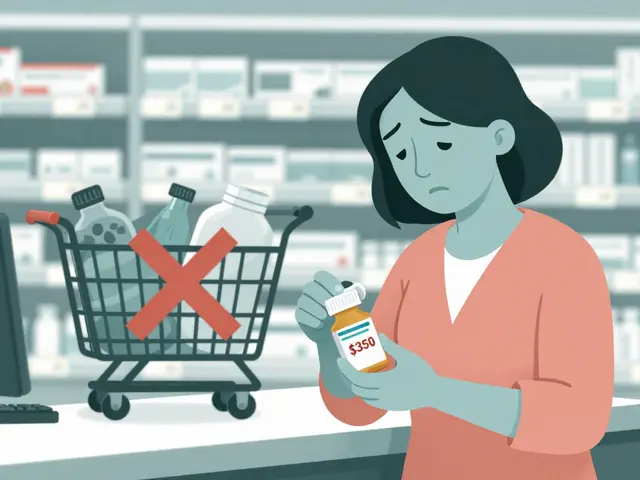
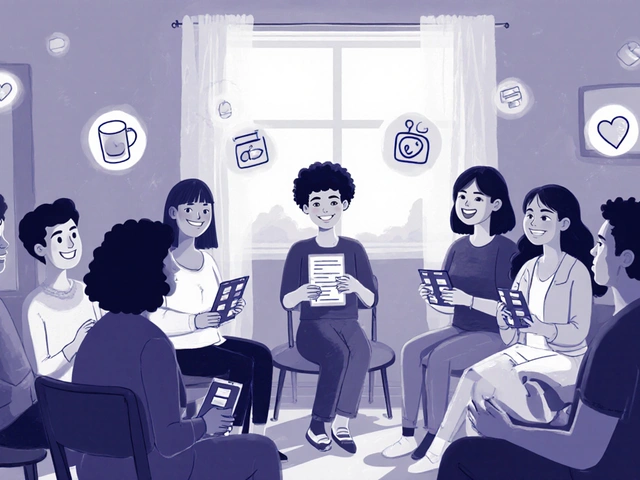
Shivam Goel
November 23, 2025 at 15:06This is fascinating-peer support isn't just 'nice to have,' it's a structural intervention. The 0.40 effect size? That's not statistically significant-that's clinically transformative. And yet, we still fund apps over human connection. We're optimizing for scalability, not sustainability. The WHO data isn't just a number-it's a moral failure. Why are we surprised people stop taking meds when the system treats them like a data point?
Amy Hutchinson
November 24, 2025 at 13:36I had a friend who skipped her heart meds for a year because she was too embarrassed to admit she couldn't afford them. Then her neighbor started leaving coffee and pills on her porch every morning. No lectures. Just coffee. And now she's alive. This isn't rocket science. It's just… being human.
prasad gaude
November 25, 2025 at 04:34In India, we have this concept-'sangha'-a circle of shared burden. It's not new. Our grandmothers knew this before Big Pharma ever existed. You don't cure hypertension with a pill. You cure it with someone who remembers your name when you forget to take it. The West is rediscovering what villages have always known: healing is communal. Why does it take a $300 billion loss for us to admit that?
Srikanth BH
November 26, 2025 at 01:33If you're struggling with adherence, you're not broken. The system is. I've seen people quit meds because the pharmacy wouldn't refill until the 28th, but their prescription ran out on the 25th. No one asks why. We just label them 'non-compliant.' But if you're juggling three chronic conditions, three pharmacies, and a job that doesn't give you lunch breaks-you're not lazy. You're surviving. Support groups don't fix compliance. They fix dignity.
Jennifer Griffith
November 27, 2025 at 14:42I mean like… why are we even talking about this? Like, just set phone alarms. Or get a pill organizer. Or like… duh? Why do you need a whole group to remember to take your blood pressure meds? I took mine every day for 10 years without a single support group. Maybe people just need to be less lazy?
Shirou Spade
November 27, 2025 at 21:59There’s a quiet truth here: medication adherence isn’t about willpower. It’s about belonging. When you’re alone in your suffering, the pill becomes a symbol of failure. But when someone says, 'I took mine today too,' it becomes a ritual of survival. The real innovation isn’t the app or the pharmacist-it’s the moment you realize you’re not the only one carrying this weight.
Lisa Odence
November 28, 2025 at 14:22This is such an important topic!! 🙌 I work in public health and I can tell you-peer support isn't just 'effective,' it's revolutionary. The 28% increase in adherence? That's not a stat-it's lives saved. And the fact that pharmacists outperform doctors in adherence programs? That's a systemic indictment! We need to fund this like it's emergency medicine. Because it is. 💊❤️
Josh Zubkoff
November 28, 2025 at 17:37Let’s be real. This whole peer support thing is just woke capitalism repackaged as healthcare. You think someone’s gonna stick with their meds because some guy in a Facebook group said 'I got you'? Meanwhile, the same people can’t get a $5 generic med because their insurance has a $200 deductible. This isn’t a solution-it’s a distraction. We need price controls, not pep talks. And don’t even get me started on 'hybrid models'-it’s just another way to monetize vulnerability.
fiona collins
November 29, 2025 at 21:58Rural access is the silent crisis. I live in a town with 3,000 people. The nearest support group is 70km away. Mobile health workers are not a luxury-they’re a lifeline. And they should be paid, trained, and respected as clinical partners, not volunteers.
Emily Craig
November 30, 2025 at 13:03I used to hate my meds. I thought they made me weak. Then I joined a group where a 72-year-old woman told me she took hers while watching The Bachelor. Said it helped her feel like she was doing something for herself, not just for her doctors. I cried. I started taking mine. Now I’m down from 10 missed doses a month to one. I don’t care if it’s 'unscientific'-it worked. And that’s all that matters.
Karen Willie
November 30, 2025 at 13:34I’ve been running a diabetes group for 5 years. We don’t talk about HbA1c. We talk about what made today hard. Did you sleep? Did you eat? Did you feel seen? The meds follow the connection. Always. People don’t need more information. They need to know someone’s still there when the world forgets them.
Andrew McAfee
December 2, 2025 at 10:20In my community, we have a group led by a retired nurse and a guy who lost his wife to heart failure. He shows up every Tuesday. He doesn’t give advice. He just says, 'I’m here.' That’s all. And that’s enough. The science backs it up-but the soul already knew.
Andrew Camacho
December 2, 2025 at 23:20You know what’s really happening here? The healthcare system is outsourcing its failures to unpaid volunteers. Peer mentors are being asked to carry the emotional labor that nurses and social workers used to do-without pay, without benefits, without recognition. This isn’t innovation. It’s exploitation dressed up as compassion.
Sharley Agarwal
December 3, 2025 at 01:14Most of these groups are just therapy for people who can't afford real therapy. And let's be honest-how many are run by people who just want to feel important? I've been in groups where the 'facilitator' spent 40 minutes talking about their own struggles. Nobody asked for that.
Timothy Sadleir
December 4, 2025 at 19:30This is all a distraction. The real issue is pharmaceutical monopolies. Why are we spending billions on peer groups when insulin still costs $300 a vial? The system is designed to keep you sick and dependent. Support groups are just a Band-Aid on a hemorrhage. And don’t tell me about 'ROI'-this is about profit, not people.
Roscoe Howard
December 6, 2025 at 01:55I’ve read this entire article. And I have to say-this is why America is falling apart. We’re giving away taxpayer money to community groups while our own veterans can’t get a prescription filled. This isn’t healthcare. It’s socialism for the chronically ill. And it’s not sustainable. We need personal responsibility, not group hugs.
Kimberley Chronicle
December 6, 2025 at 09:22The integration of pharmacists into peer-led models represents a paradigm shift in decentralized care delivery. The pharmacokinetic literacy they bring to the table significantly mitigates polypharmacy risks, thereby enhancing therapeutic adherence through cognitive alignment. This is not merely psychosocial-it’s pharmacoeconomic optimization.
Patricia McElhinney
December 6, 2025 at 10:52I work in a hospital and I see this every day. People come in because they didn't take their meds. We blame them. But the truth? Half the time they can't afford them. Or their insurance changed. Or the pharmacy is closed on Sundays. And now we're telling them to join a group? Please. Fix the system before you ask people to fix themselves.
Dolapo Eniola
December 7, 2025 at 17:51In Nigeria, we don't have 'support groups.' We have family. We have neighbors. We have the auntie who brings your pills when you're too weak to walk. No app. No certification. Just love. Why do we need a $50 million grant to replicate what culture already does? This is colonial thinking-westernizing survival.
Agastya Shukla
December 8, 2025 at 14:12The data is clear. But what’s missing is longitudinal tracking. We need standardized metrics across programs-not just self-reports. The Morisky scale is a start, but we need interoperable digital dashboards linked to EHRs. Without this, we’re flying blind. Funding without measurement is just charity with a PowerPoint.